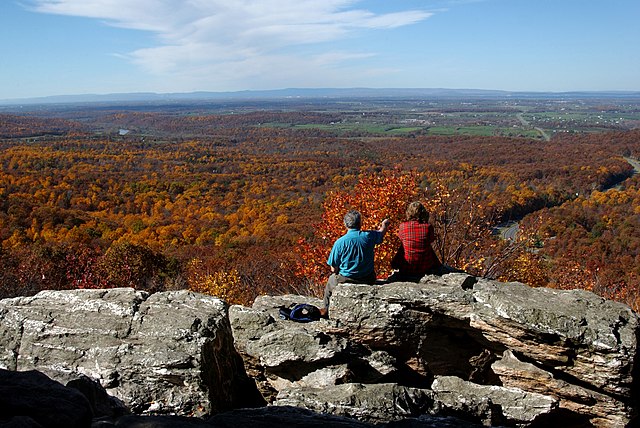Shenandoah Valley
valley and cultural region of western Virginia and the Eastern Panhandle of West Virginia in the United States From Wikipedia, the free encyclopedia
Remove ads
The Shenandoah Valley /ˌʃɛnənˈdoʊə/ (nicknamed "The Big Valley"[1] ) is a geographic valley and cultural region of western Virginia and the Eastern Panhandle of West Virginia in the United States. The valley is bounded on the east by the Blue Ridge Mountains. On the west it is bounded by the eastern front of the Appalachians. To the north it goes to the Potomac River and to the south by the James River. The cultural region covers a larger area that includes all of the valley plus the Virginia highlands to the west, and the Roanoke Valley to the south. The Valley is about 200 miles (320 km) long.[1] It is the home of two well-known universities, James Madison and Shenandoah University.[2]

Map of the Shenandoah Valley

The Shenandoah Valley in the autumn
Remove ads
History
For nearly 11,000 years before the Europeans came, Native Americans lived in the Shenandoah Valley.[3] The first European to visit the area was probably a Jesuit priest in 1632.[3] However, the first European credited with exploring the Valley was a German doctor named John Lederer in 1669.[3] In the 1600s, Englishmen were told about the large forests which included chestnut trees as tall as 600 feet (180 m).[4]
Jackson's Valley Campaign Was fought here in 1862.
Remove ads
Geography
It is named for the river that stretches much of its length. The Shenandoah Valley has eight counties in Virginia and two counties in West Virginia.[5]
- Frederick County, Virginia
- Clarke County, Virginia
- Warren County, Virginia
- Shenandoah County, Virginia
- Page County, Virginia
- Rockingham County, Virginia
- Augusta County, Virginia
- Rockbridge County, Virginia
- Berkeley County, West Virginia
- Jefferson County, West Virginia
The cultural region includes five more counties in Virginia:[5]
At Harpers Ferry the Shenandoah River joins the Potomac.[6] The Valley's cultural region contains 10 independent cities:
Remove ads
References
Other websites
Wikiwand - on
Seamless Wikipedia browsing. On steroids.
Remove ads
